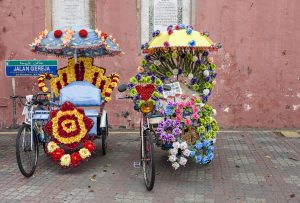The Basics, Upfront
When people think of teaching English in Southeast Asia, most of them start with Thailand or Vietnam. Cambodia usually comes up down in the list – if at all 🙂
But once you take a closer look, it’s actually one of the easier places to get started.
You don’t need a long list of documents. Schools in Cambodia hire English teachers throughout the year. And the living costs are pretty low, which helps if you are trying to save or just get by without any stress.
In Cambodia, things don’t always work the way you expect. But a lot of teachers end up staying there for a longer period than planned – because the lifestyle is simple, the people are friendly, and teaching here can be rewarding.
So, is Cambodia worth thinking about – when it comes to teaching English?
Here’s a quick look at both sides:
Why some teachers choose it:
- It is much easier to find a job, even without lots of experience
- The cost of living is low
- The pace of life is slower, and people are usually welcoming
What some people find difficult:
- The salary might be slightly on the lower side compared to other countries in the region
- There is not always a clear system for contracts or benefits
- It will take a while for one to adjust to the climate and everyday life
If you are looking for a place to teach without too many barriers, Cambodia is worth looking into. But if you are after higher pay or a more structured school system, this may not be the right match.
In this article, we’ll cover:
- What English teaching jobs in Cambodia look like in 2025
- What kind of visa and paperwork you’ll need to start teaching
- How much you’ll get paid – and what daily life costs
- Where to find English teaching work and how to apply
- What to expect once you are actually in the classroom
Let’s get into it – one step at a time.
The Demand for English Teachers in Cambodia – What to Know in 2025
If you are wondering whether there is demand for English teachers in Cambodia, the answer is yes. There is.
Cambodia may not have the same number of teaching jobs as Japan, Korea, Thailand or Vietnam. However, having said that, the schools here continue to hire English teachers throughout the year. Which means, that the demand is steady, especially in private language centres and schools in cities like Phnom Penh, Siem Reap, and Battambang.
One of the main reason for this demand is that many parents want their kids to speak English from a young age (we all want that, right?). English is not just another subject here. It is seen as a skill (people do boast about it) that can open up a lot of job opportunities in tourism, hospitality, business, and even abroad. Because of this, families are often willing to pay for extra classes or weekend tutoring, even if they have to pay more than the school tuition.
You will find the demand for most of the jobs in private institutions, and not much in government schools. When I say private institutions, that includes language centres, private schools, international schools, and after-school tutoring centres. Some roles are full-time, but many teachers also prefer part-time classes or a mix of both.
Let’s look at the teaching market in Cambodia right now:
- Private language centres continue to have the highest demand for English teachers.
- Jobs are available year-round, and not just during the fixed hiring seasons.
- Phnom Penh has the most opportunities, which is followed by Siem Reap and a few other growing towns.
- International schools hire fewer teachers, but they definitely offer better salaries and more structure.
- Rural areas do need teachers, but most of the jobs are unpaid volunteer roles, or paid very less.
Some schools are even open to hiring teachers without a degree, as long as they have a TEFL certificate (120 hours + practicum) – and are confident in the classroom. Others prefer some experience, especially when it comes to teaching grammar, exam prep, or business English.
The demand is real, but here are a few things that you should keep in mind:
- Jobs are not always advertised online. Word of mouth and in-person visits still work well.
- Some schools may not offer formal contracts. That means it is important for you to ask clear questions before accepting any offer.
- There is more demand for teachers who plan to stay for at least six months (or more). Many schools do not want to hire someone who will leave after a couple of weeks (quite obvious).
While Cambodia does not have a national program for placing English teachers, the private sector fills that gap. Also, as tourism and other businesses are slowly returning to the pre-pandemic levels, English remains a skill that people want to invest in.
So, if you are flexible, open-minded, and ready to adapt (and adjust), there is always demand for English teachers. And I am sure that this demand is likely to continue (and increase) in the coming years.
What are the Requirements to Teach English in Cambodia?
The good news is that the basic requirements to teach English in Cambodia are more flexible compared to other countries in the region. This is one of the reasons many first-time teachers choose to start here.
You do not need to have a teaching licence or even a university degree for many entry-level jobs. A TEFL certificate and strong spoken English can often be enough to get hired.
That said, not all jobs are the same. Some schools have higher expectations than others, especially when it comes to salary, workload, and student level.
A Quick List of Requirements:
- A TEFL, TESOL, or CELTA certificate (120 hours or more is ideal)
- Clear spoken English and strong communication skills
- A university degree is preferred by some schools, but not required everywhere
- Teaching experience is a bonus, but many centres are open to training new teachers
- A clean police background check (some employers may ask for this)
- A passport from an English-speaking country helps, but it is not a hard rule
Most of the English teaching jobs in Cambodia involve working with children or teenagers. However, there are adult classes and business English roles available in bigger cities. If you are applying for a higher-paying job, especially at an international school, then a degree and some classroom experience will surely be expected.
Some schools may also ask for a demo lesson or short trial class before offering a position. This is quite normal and not something to worry about. As a matter of fact, this is where you should score your points 🙂
You do not need to speak Khmer (the local language) to teach here, though learning a few basic words can help in the classroom and day-to-day life.
Visa and Work Permit – What You Actually Need
Cambodia is known for having one of the more relaxed visa systems in Southeast Asia, especially for English teachers. But it is still important to understand how the process works.
Most teachers arrive in Cambodia on a tourist visa or an ordinary visa (called an E-class visa). The E-class visa is the one you want if you plan to stay longer and work legally.
Here is how it usually works:
- You enter Cambodia on an E-class visa (not the tourist one)
- After one month, you can extend it into a long-term visa (6 months or 12 months)
- To work legally, you also need a work permit, which is handled by the Ministry of Labour
- Some schools will help you with the work permit paperwork, others may ask you to sort it out yourself
In reality, not every school offers full support with visas and permits. Some teachers end up working under the radar, especially in smaller centres or short-term roles. But this is a grey area, and it is better to ask upfront before accepting a job.
A few things to keep in mind:
- The visa process is usually handled in-country – you do not need to apply from home
- Visa agents in Phnom Penh and Siem Reap can help with renewals or changes
- You will need passport photos and basic documents for the extension process
- The cost of a one-year visa extension is usually between $280 and $300
- A legal work permit costs extra, and not all teachers apply for it right away
Cambodia does not have strict border checks for foreign teachers the way some other countries do, but the system is slowly becoming more regulated. If you plan to teach long-term, it is worth doing things the legal way from the start.
Summary: Visa and Work Permit for Teaching in Cambodia
| Step | What It Is | Notes |
| Entry Visa | E-class (Ordinary Visa) | Ask for this on arrival – not a tourist visa |
| Visa Extension | 6-month or 12-month option | Costs around $280-$300; handled through agents or yourself |
| Work Permit | Legal permission to teach | Some schools help, others expect you to manage it |
| Documents Needed | Passport, visa, photos, forms | Checklist varies slightly; agents can help streamline it |
| Visa Agents | Local support service | Common in Phnom Penh and Siem Reap; saves time |
| Tourist Visa | Not suitable for teaching | Avoid using this if you plan to work |
“Cambodia does not make you jump through as many hoops as other countries, but you still need to ask questions and stay informed. A few clear steps early on can save you a lot of confusion later.”
Types of English Teaching Jobs in Cambodia
Not all English teaching jobs in Cambodia are the same. The hours, pay, expectations, and even the students can vary depending on where you work. Here is a breakdown of the main types of teaching jobs available:
Private Language Centres
These are the most common and easiest ones to get into. Students are usually kids or teens who come for extra English lessons after school or on weekends. Some centres run adult classes too.
- Classes are in the afternoons, evenings, or during weekends
- Curriculum is usually provided, but you will still need to prep
- Pay is hourly or monthly – around $800 to $1,200 per month full-time
- Some centres offer part-time roles if you want flexibility
Private Schools
These schools follow a more structured school calendar and may teach multiple subjects in English. You might be teaching English or English-based subjects like science or social studies.
- More regular hours (usually Monday to Friday)
- Students are from more well-off families
- Pay ranges from $1,000 to $1,500 or more, depending on the school
- Often expect more experience or at least a degree
International Schools
These are fewer in number, but they offer the best pay and conditions. They follow international curricula (IB, British, American) and usually require certified teachers.
- Higher salaries – sometimes $2,000 to $2,500+ per month
- Small class sizes, good resources, and longer-term contracts
- You will need teaching credentials and experience to be considered
- Hiring is more formal, sometimes months in advance
NGOs and Volunteer Projects
There are community schools and NGOs that offer free English classes to kids in rural areas or low-income communities. Some pay a small stipend, but many are unpaid.
- Great for short-term or gap-year teaching
- No formal experience usually required
- Can be rewarding, but sometimes under-resourced
- Not ideal if you need to rely on a salary
Private Tutoring
Many teachers earn extra by tutoring students on the side. This could be one-on-one or small groups, often focused on conversation, grammar, or exam prep.
- Flexible hours – early morning, evenings, or weekends
- Pay ranges from $10 to $20 per hour, sometimes more
- Most students come through word of mouth
- You need to manage your own schedule and materials
Note: Most full-time teachers in Cambodia are working in private schools or language centres. International schools and NGOs make up a smaller part of the market, but they are still worth keeping an eye on.
Summary: Types of English Teaching Jobs in Cambodia
| Type of Job | Typical Students | Pay Range (USD/month) | Requirements | Notes |
| Language Centres | Kids, teens, adults | $800 – $1,200 | TEFL, fluent English | Flexible hours; common entry point |
| Private Schools | Primary & secondary | $1,000 – $1,500+ | TEFL, degree preferred | Regular schedule; better structure |
| International Schools | All ages (varies) | $2,000 – $2,500+ | Degree + teaching license | Competitive; formal curriculum |
| NGOs/Volunteer | Rural or low-income | Unpaid or small stipend | TEFL sometimes optional | Good for short-term; less structure |
| Private Tutoring | Mixed (1:1 or small groups) | $10 – $20/hr | TEFL helps; word of mouth | Side income; build client base locally |
Salary, Living Costs, and Lifestyle in Cambodia
Salaries in Cambodia are not as high as what teachers earn in places like South Korea or Japan – or even Thailand, in many cases. But the cost of living is also much lower. If you are not expecting to save a fortune and just want a decent quality of life, it balances out.
Most full-time English teachers earn somewhere between $800 and $1,500 per month. Some earn a little more, depending on the type of school, qualifications, and whether they take on extra classes.
International schools pay better, but they are harder to get into. Private language centres are the most common option, and they offer stable hours with fair pay. Many teachers pick up private students or tutoring jobs on the side to top up their income.
Here is what monthly income usually looks like:
| Type of Job | Monthly Pay (USD) |
| Private language centre | $800 – $1,200 |
| Private school (mid-tier) | $1,000 – $1,500 |
| International school | $1,500 – $2,500+ |
| Private tutoring (1-on-1) | $10 – $20 per hour |
Living costs – What you spend depends on your lifestyle
If you live modestly, do not eat out every night, and stick to local options, it is very possible to live comfortably on $600-$800 a month. Phnom Penh is a bit more expensive than smaller cities, but not by a lot.
Here is a rough breakdown of typical monthly expenses:
| Item | Monthly Cost (USD) |
| Rent (one-bedroom apartment) | $250 – $400 |
| Utilities & internet | $50 – $100 |
| Food (mix of local & Western) | $150 – $250 |
| Transport (tuk-tuks, fuel) | $30 – $60 |
| Extras (coffee, gym, etc.) | $50 – $100 |
Most teachers end up spending around $700 to $1,000 per month, depending on habits. Rent is usually the biggest cost. Shared housing is easy to find, especially among expats who come and go throughout the year.
What about lifestyle?
Life in Cambodia moves slower. Weekdays are for work, evenings are for night markets, street food, or just relaxing with a cold drink. Weekends can be quiet or busy, depending on where you are. Some teachers take short trips to Kampot, Kep, or the islands every now and then to switch things up.
There is a decent-sized expat community in Phnom Penh and Siem Reap. You will find Facebook groups, teacher meetups, and language exchanges. Making friends is not too hard if you put yourself out there a bit.
One thing to know – the heat is real. It gets hot and humid, and it takes time to get used to. Also, not every place has stable power or good air conditioning, so small things like a fan or a backup battery can make a big difference.
Pro Tip: If your school offers free housing or a housing allowance, take it seriously – it can save you a good chunk each month. Some teachers spend very little and still live comfortably, just by choosing the right apartment and eating more local meals.
How to Find a Teaching Job in Cambodia
Finding a job in Cambodia is not always about online applications and interviews. That exists, but it is only part of the picture. Many jobs are still filled through word of mouth, walk-ins, or just being in the right place at the right time.
Most schools prefer to hire teachers who are already in Cambodia – or at least nearby. Being in the country shows you are serious, and it also means they can meet you in person, see your teaching style, or have you start right away.
Online Job Boards and Facebook Groups
There are a few websites where schools post teaching jobs, but the listings are not always up to date. Still, it is a good place to start if you want to get a feel for what is out there.
Popular sites include:
- Khmer440
- BongThom.com
- Dave’s ESL Cafe (Asia section)
- Cambodia Expats Online (forums)
- Teaching Nomad or ESL Job Feed (occasional listings)
That said, Facebook is where things really happen. Most local schools and teachers post jobs, share leads, or even ask for cover teachers in Facebook groups. You can also message schools directly once you spot an opening.
Useful Facebook groups to check out:
- Expats and Locals Living in Phnom Penh
- Cambodia English Teachers
- Teaching Jobs in Cambodia
- Cambodia Expats Classifieds
Walk-In Applications Still Work
Yes, you can still walk into a school with your CV and ask if they are hiring. It is old-school, but in Cambodia, it works – especially with language centres or small private schools.
Dress neatly (nothing too formal, just presentable), bring printed copies of your CV, and try to visit during off-teaching hours – mornings before 10 am or mid-afternoon are usually best. Some schools may ask you to come back or do a short demo. Others may say no immediately, but keep your CV on file.
Tip: A lot of hiring happens through networks. One teacher leaves, another recommends a friend. If you meet a teacher who is leaving soon, ask if their school is looking for someone to replace them.
When to Apply
There is no single “hiring season” in Cambodia. Language centres hire year-round. Private schools may have more structured hiring in August or January, but you will find positions popping up throughout the year.
That said, November to February tends to be a busy time – new terms, more students, and sometimes teachers leaving after the holidays. This is a good window to arrive and start applying.
Documents to Keep Ready
Even though not all schools ask for everything right away, it helps to have these ready:
- Updated CV with a passport-style photo
- Copy of your passport
- Copy of your TEFL certificate (digital and printed)
- Reference letter or contact from a previous job (if you have one)
- Police clearance or background check (optional but useful)
Some schools may ask for a short trial lesson or teaching demo, especially if they have not seen you teach before.
Can You Find a Job Before Arriving?
Sometimes – but not always. A few international schools and larger centres may hire from overseas, especially if you have experience or a teaching degree. But most of the hiring happens on the ground.
If you are just starting out or do not have a long resume, it is better to arrive on a tourist or E-class visa, explore the city, and apply in person. Many teachers land jobs within the first couple of weeks.
Real Talk: Some schools will try to offer you a job quickly – even after a 10-minute chat. Do not feel rushed. Ask questions about pay, hours, visas, and whether there is a written contract. Trust your gut.
Life Outside the Classroom – What It’s Really Like
Teaching is just one part of your experience in Cambodia. What you do before and after class – like: where you live, what you eat, with whom you spend time with, all these shapes how the whole thing feels. And Cambodia, although seems a bit right, has its own way of making ones daily life feel simple and real.
What’s Daily Life and Routine Like?
Most teachers prefer to live in or around Phnom Penh or Siem Reap, since that is where most of the jobs and facilities are. As for routine, you will likely start your day with a quick breakfast – maybe eggs and rice, or just strong iced coffee from a street vendor – and head to school either by tuk-tuk, motorbike, or on foot if you are close by.
Classes tend to start later in the day. Morning shifts are common in schools, but many language centres operate in the afternoon and evening. That means you might have a few hours in the late morning to relax, prep lessons, or explore a bit.
After work, teachers often head to a local restaurant or café. Western food is easy to find in the cities, but once you settle in, you might start leaning more into local spots – grilled meats, soups, fresh fruit, or fried rice for a couple of dollars.
The Social Scene
The expat community in Cambodia is kind of relaxed, not pro-active as others. There are a few Facebook groups, and meetups, especially in Phnom Penh. Most people find it easy to make friends if they are open to chatting with strangers or saying yes to invites.
It is not a huge party scene unless you are actively looking for that – but there are bars, live music spots, and riverfront hangouts. Many teachers spend their weekends catching up with other expats, going on short trips, or just enjoying a quiet evening at home.
Pro Tip: Do not over-commit socially in your first few weeks. Adjust to the rhythm first – the heat, the noise, the pace – then find your groove.
Transport and Getting Around
Tuk-tuks are the default way to get around, especially if you are new. You can flag one down or use local ride-hailing apps like PassApp. Motorbikes are also popular among long-term teachers, though the traffic takes getting used to.
Roads are a mix – paved in central areas, dusty or flooded in others. It is not always convenient, but it works. And somehow, you get used to the unpredictability.
Health, Safety, and Comfort
Cambodia is generally safe, especially during the day. Petty theft happens now and then (mostly phones or bags left unattended), but violent crime is rare. Most teachers say they feel comfortable walking around their neighborhoods.
Health care is okay in big cities. There are decent private clinics, but for anything serious, many expats go to Thailand or Vietnam. Most teachers take out basic travel or expat health insurance, just in case.
The heat and humidity can be tiring – especially in April, which is peak hot season. Power cuts can still happen in some areas. And internet is fine for the most part, but not perfect.
Info Block – Essentials for Daily Life
- Mobile SIM: Easy to get with data, cheap plans available
- Water: Drink bottled, not from the tap
- Electricity: Can be expensive if you use AC often
- Shopping: Markets are everywhere; Western groceries are available but pricey
Travel and Weekend Trips
One of the best parts about living in Cambodia is how easy it is to escape the city. You can take a minivan or bus and reach the coast, the countryside, or another city in a few hours.
Popular weekend spots include:
- Kampot – riverside town with good food and chill vibes
- Kep – seaside town known for crab and calm beaches
- Koh Rong / Koh Rong Samloem – island escapes with clear water and beach huts
- Battambang – quieter, older town with colonial charm and rice fields
Most trips are budget-friendly, and many teachers make a habit of going somewhere new every month or two.
Is Teaching in Cambodia Still Worth It in 2025 and Beyond?
It depends on what you are looking for.
If you are hoping to teach in a country with high salaries, fully air-conditioned classrooms, and perfect infrastructure, Cambodia might not be the best choice.
But if your goal is to teach without too much red tape, experience life in a place that is still changing, and have more freedom in how you live and work – Cambodia still offers that.
Why some teachers still choose Cambodia over other countries
- Lower entry barriers – You do not need a teaching degree or years of experience to get started
- Flexible lifestyle – Most jobs do not come with long contracts or strict conditions
- Cost of living – It is possible to live well even on a modest salary
- Less competition – You are not one of 500 applicants for every position
- Cultural experience – Life here is different, and that difference can be refreshing
What might make you think twice
- Salaries are lower – It is enough to live on, but not much more
- Visa support is not always clear – You might need to handle things yourself
- No strong system – Schools vary a lot, and some have little structure
- Heat, dust, and chaos – These are part of daily life, and not everyone enjoys it
Final Thought:
Cambodia is not trying to be like its neighbors. It is not polished or predictable. But that is also why some teachers find it more real, more personal, and more rewarding.
If you are open to working with what you have, willing to adapt, and not looking for a perfect setup – teaching in Cambodia is still a solid choice.






